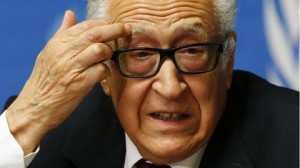 The participants in the Syrian peace conference averted a collapse in the talks on Friday, agreeing to meet in the same room on Saturday for the first time.
The participants in the Syrian peace conference averted a collapse in the talks on Friday, agreeing to meet in the same room on Saturday for the first time.
Earlier, the government delegation had threatened to bolt, while the opposition complained that the government side was not fully committed to the framework of the talks.
After a day of frantic negotiations, however, the United Nations special envoy to the talks announced at a press briefing that the two sides had agreed to meet. “Tomorrow we expect, and we’ve agreed, that we will meet in the same room,” the envoy, Lakhdar Brahimi, told reporters.
It was unclear whether the sides would face each other in the meeting or sit separately, with Mr. Brahimi shuttling back and forth, in what are known as proximity talks.
United Nations officials had hoped to hold a face-to-face meeting between the government and the opposition on Friday, the third day of talks aimed at ending Syria’s war. When that failed, Syrian government officials said they would leave if the meeting was not rescheduled for the next day.
At the same time, members of the opposition said the government delegation was divided, particularly on the question of discussing the formation of a transitional government.
“This is not a juggernaut,” said Oubai Shahbandar, an adviser to the opposition coalition. “There are serious splits in the government delegation.”
He said that every time the Syrian Foreign Ministry representatives said anything that indicated movement toward compromise, those directly representing President Bashar al-Assad countered with a harder line.
The government delegation and its supporters retorted that the opposition was shifting position, as plans seesawed about whether the two sides would sit down in the same room in the United Nations offices in Geneva.
The crux of the dispute between the sides is the protocol for the meeting, set out in a June 2012 agreement known as Geneva 1. The opposition has demanded that the government formally confirm that it accepts the protocol, which calls for a fully empowered transitional governing body to be formed by “mutual consent.”
On Friday morning, the Syrian deputy foreign minister, Fayssal Mekdad, told reporters that the delegation was in Geneva to put Geneva 1 into effect; otherwise, he said, it would not have come. But Bouthaina Shaaban, an adviser to Mr. Assad, told the BBC: “By coming here we acknowledge the Geneva communiqué, but not all of it. It’s not a bible.”
Later, the foreign minister, Walid al-Moallem, told Syrian state television that his team would leave on Saturday if “serious” talks did not begin, saying the government was ready and the opposition was not.
Opposition members said their team changed its mind when the contradictory statements emerged from the government on Friday morning. But it was unclear how committed they had been to the face-to-face encounter. Louay Safi, a spokesman for the opposition delegation, had already said Thursday night that the two sides would sit in separate rooms on Friday, with Mr. Brahimi.
In the news conference, Mr. Brahimi said that the talks would proceed on the basis of the Geneva 1 communiqué, and that “the two parties know that every well, and accept it.”
Demonstrators held the flags of the Syrian opposition and signs reading “Your silence is killing children” outside the Palace of Nations, the United Nations headquarters here, as the talks went on inside.
It remained unclear whether any rebel commanders would show up for the talks to counter the widespread impression that the opposition coalition has no connection to fighters on the ground. Jamal Maarouf, the head of the Syrian Revolutionary Front, the lone group that had committed unambiguously to attending, said in an interview on Friday morning that none of his representatives were in Geneva yet
While the atmosphere indoors continued to be acrimonious and uncertain, outside the building there were calls for compromise, even from die-hard supporters of the uprising.
Under bright sunlight on the plaza in front of the United Nations headquarters here in Geneva, young Syrian men, their arms around each other’s shoulders, sang a dirge commonly heard at antigovernment rallies in Syria. “Mothers of the martyrs, never fear,” they chanted. “Mothers of the martyrs, we are with you. The gates of heaven are opening for your sons.”
Nearby, Marie-Therese Kiriaky, who is from Damascus but is living in Germany, held a sign calling for peace. “We are the people whose voices are never heard,” she said. “Enough is enough. This is the biggest massacre in this century, and it is a shame on humanity that the world doesn’t react.”
Although Ms. Kiriaky said she would not accept Mr. Assad staying in power, she said the first priority was a cease-fire.
As a Syrian Christian, she said, she rejected Mr. Assad’s claim to be a protector of a secular order.
“They have destroyed Maaloula” — an ancient Christian town where Aramaic is still spoken — “and more than 350,000 Christians have left Syria, and he claims to be protecting us?” Ms. Kiriaky said. “We don’t want his protection. If he is protecting us because we are Christians, enough, we will convert to Muslims.”
She said that both government shelling and insurgent attacks were responsible for destroying Maaloula, but that “state violence is the most dangerous.”
Syrian Christians, she said, are divided, like most Syrians. A third of them, the intellectuals, oppose Mr. Assad, she said, while another third, mainly those who benefit from his rule, support him, and another third do not know what to do.
“They are really scared,” she said.
NY Times

Leave a Reply
You must be logged in to post a comment.